working papers
revise and resubmit
-
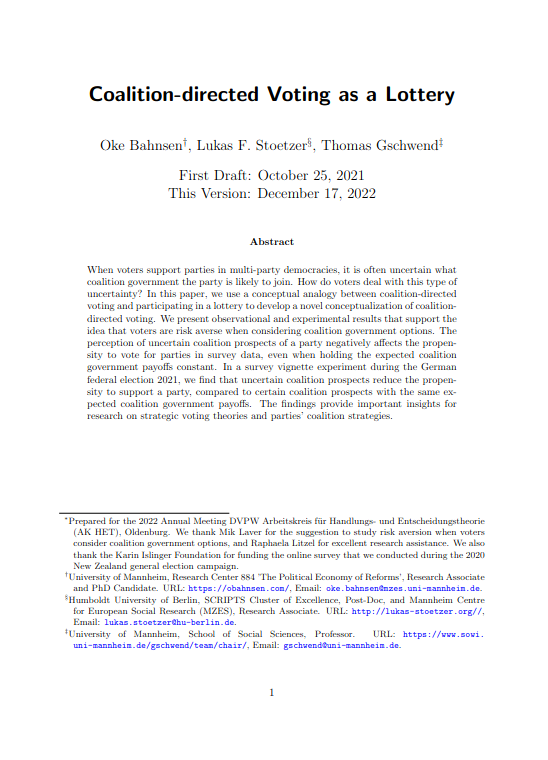 Coalition-directed Voting under UncertaintyOke Bahnsen, Lukas F Stoetzer, and Thomas GschwendWorkshop on Coalition Politics Humboldt University 2022 2022
Coalition-directed Voting under UncertaintyOke Bahnsen, Lukas F Stoetzer, and Thomas GschwendWorkshop on Coalition Politics Humboldt University 2022 2022When voters support parties in multi-party democracies, it is often uncertain what coalition government the party is likely to join. How do voters deal with this type of uncertainty? In this paper, we use a conceptual analogy between coalition-directed voting and participating in a lottery to develop a novel conceptualization of coalition-directed voting. We present observational and experimental results that support the idea that voters are risk averse when considering coalition government options. The perception of uncertain coalition prospects of a party negatively affects the propensity to vote for parties in survey data, even when holding the expected coalition government payoffs constant. In a survey vignette experiment during the German federal election 2021, we find that uncertain coalition prospects reduce the propensity to support a party, compared to certain coalition prospects with the same expected coalition government payoffs. The findings provide important insights for research on strategic voting theories and parties’ coalition strategies.
@article{bahnsen2022, bibtex_show = {true}, status = {rar}, year = {2022}, title = {Coalition-directed Voting under Uncertainty}, project = {pec}, impact = {1}, author = {Bahnsen, Oke and Stoetzer, Lukas F and Gschwend, Thomas}, journal = {Workshop on Coalition Politics Humboldt University 2022}, preview = {wp_risk.png} } -
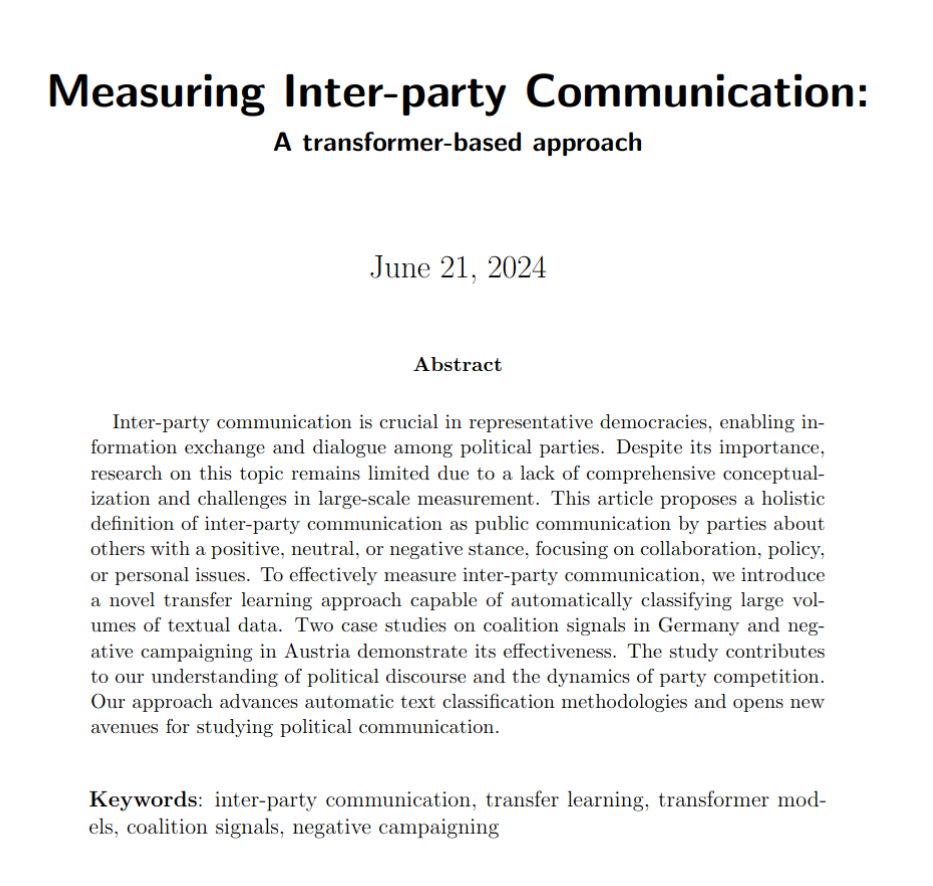 Measuring Inter-party Communication: A transformer-based approachAnna Adendorf, Oke Bahnsen, Thomas Gschwend, Lena Huber, Simone Paolo Ponzetto, Ines Rehbein, and Lukas F. Stoetzer2022
Measuring Inter-party Communication: A transformer-based approachAnna Adendorf, Oke Bahnsen, Thomas Gschwend, Lena Huber, Simone Paolo Ponzetto, Ines Rehbein, and Lukas F. Stoetzer2022Inter-party communication is crucial in representative democracies, enabling information exchange and dialogue among political parties. Despite its importance, research on this topic remains limited due to a lack of comprehensive conceptualization and challenges in large-scale measurement. This article proposes a holistic definition of inter-party communication as public communication by parties about others with a positive, neutral, or negative stance, focusing on collaboration, policy, or personal issues. To effectively measure inter-party communication, we introduce a novel transfer learning approach capable of automatically classifying large volumes of textual data. Two case studies on coalition signals in Germany and negative campaigning in Austria demonstrate its effectiveness. The study contributes to our understanding of political discourse and the dynamics of party competition. Our approach advances automatic text classification methodologies and opens new avenues for studying political communication.
@article{adendorf2014, bibtex_show = {true}, author = {Adendorf, Anna and Bahnsen, Oke and Gschwend, Thomas and Huber, Lena and Ponzetto, Simone Paolo and Rehbein, Ines and Stoetzer, Lukas F.}, status = {rar}, title = {Measuring Inter-party Communication: A transformer-based approach}, impact = {2}, preview = {wp_transformer.png} }
under review
-
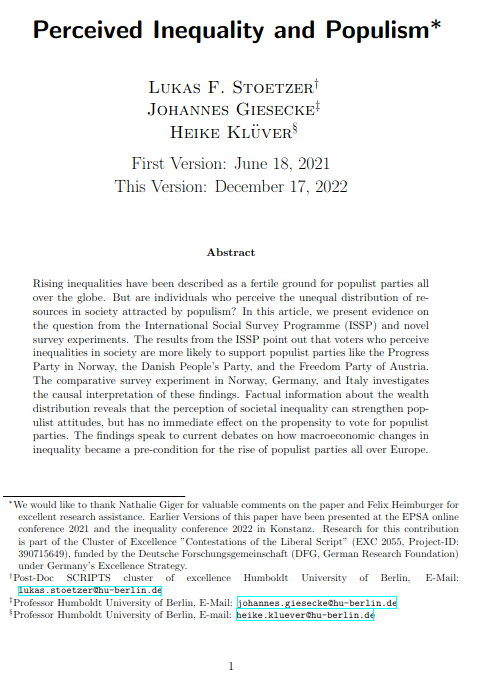 Perceived Inequality and PopulismLukas F Stoetzer, Heike Klüver, and Johannes GieseckeEuropean Political Science Association Conference 2021 and Inequality Conference, University of Konstanz 2022 2023
Perceived Inequality and PopulismLukas F Stoetzer, Heike Klüver, and Johannes GieseckeEuropean Political Science Association Conference 2021 and Inequality Conference, University of Konstanz 2022 2023Rising inequalities have been described as a fertile ground for populist parties all over the globe. In this article, we argue that the perception of Inequality alone can strengthen populist attitudes and increase support for populist parties. Using data from the International Social Survey Programme, we find that those who perceive greater inequality in society are more likely to support populist parties. To explore the causal relationship, the study also conducts a survey experiment in Denmark, Germany, and Italy, randomly exposing participants to factual information about the wealth distribution. The results show that the perception of inequality can increase populist attitudes, but does not immediate affect the likelihood of voting for populist parties in this context. The findings speak to current debates on how inequality and their perception became a pre-condition for the rise of populist parties all over Europe.
-
 The Electoral Effects of State-Sponsored Homophobia Test2024
The Electoral Effects of State-Sponsored Homophobia Test2024Do strategies of state-sponsored homophobia translate into electoral gains? While a growing body of literature documents the increasing politicization of LGBTQ- and gender-related issues by illiberal elites, little is known about the electoral effects of these strategies. We address this important question by studying whether anti-LGBTQ mobilization pays off electorally for the initiating party. Empirically, we study the adoption of anti-LGBTQ resolutions in many Polish municipalities prior to the 2019 parliamentary election. Using a synthetic difference-in-differences design, we find that the adoption of anti-LGBTQ resolutions increased support for the governing Law and Justice party, while decreasing opposition parties’ ability to mobilize in affected municipalities. Overall, this study’s findings are relevant for understanding the electoral consequences of both elite-led mobilization against stigmatized and discriminated groups, and policies of subnational democratic backsliding.
in preparation
-
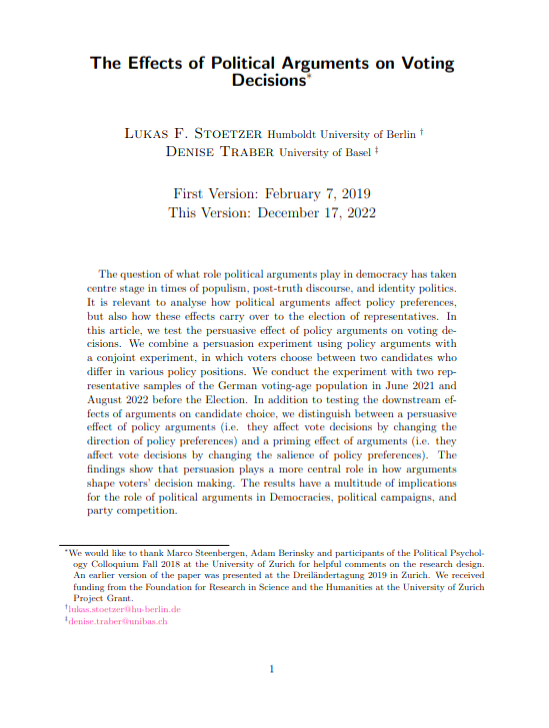 The Effect of Political Arguments on Voting DecisionsLukas F Stoetzer, and Denise TraberSwiss Political Science Association (SPSA) Annual Conference in Zurich 2019 and Midwest Political Science Association conference in Chicago 2019. 2019
The Effect of Political Arguments on Voting DecisionsLukas F Stoetzer, and Denise TraberSwiss Political Science Association (SPSA) Annual Conference in Zurich 2019 and Midwest Political Science Association conference in Chicago 2019. 2019The question of what role political arguments play in democracy has taken centre stage in times of populism, post-truth discourse, and identity politics. It is relevant to analyse how political arguments affect policy preferences, but also how these effects carry over to the election of representatives. In this article, we test the persuasive effect of policy arguments on voting decisions. We combine a persuasion experiment using policy arguments with a conjoint experiment, in which voters choose between two candidates who differ in various policy positions. We conduct the experiment with two representative samples of the German voting-age population in June 2021 and August 2022 before the Election. In addition to testing the downstream effects of arguments on candidate choice, we distinguish between a persuasive effect of policy arguments (i.e. they affect vote decisions by changing the direction of policy preferences) and a priming effect of arguments (i.e. they affect vote decisions by changing the salience of policy preferences). The findings show that persuasion plays a more central role in how arguments shape voters’ decision making. The results have a multitude of implications for the role of political arguments in Democracies, political campaigns, and party competition.
@article{stoetzer2019vote, bibtex_show = {true}, title = {The Effect of Political Arguments on Voting Decisions}, author = {Stoetzer, Lukas F and Traber, Denise}, year = {2019}, impact = {2}, status = {conf}, journal = {Swiss Political Science Association (SPSA) Annual Conference in Zurich 2019 and Midwest Political Science Association conference in Chicago 2019.}, preview = {wp_arg.png} } -
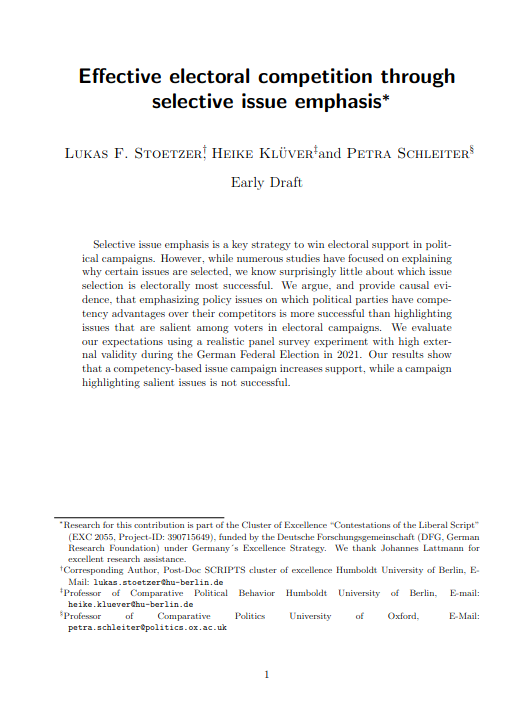 Effective electoral competition through selective issue emphasisLukas F Stoetzer, Heike Klüver, and Petra SchleiterAmerican European Political Science Association Conference 2022. 2022
Effective electoral competition through selective issue emphasisLukas F Stoetzer, Heike Klüver, and Petra SchleiterAmerican European Political Science Association Conference 2022. 2022Selective issue emphasis is a key strategy to win electoral support in political campaigns. However, while numerous studies have focused on explaining why certain issues are selected, we know surprisingly little about which issue selection is electorally most successful. We argue, and provide causal evidence, that emphasizing policy issues on which political parties have competency advantages over their competitors is more successful than highlighting issues that are salient among voters in electoral campaigns. We evaluate our expectations using a realistic panel survey experiment with high external validity during the German Federal Election in 2021. Our results show that a competency-based issue campaign increases support, while a campaign highlighting salient issues is not successful.
@article{stoetzer2022, bibtex_show = {true}, status = {conf}, year = {2022}, title = {Effective electoral competition through selective issue emphasis}, author = {Stoetzer, Lukas F and Klüver, Heike and Schleiter, Petra}, journal = {American European Political Science Association Conference 2022.}, impact = {2}, preview = {wp_issue.png} } -
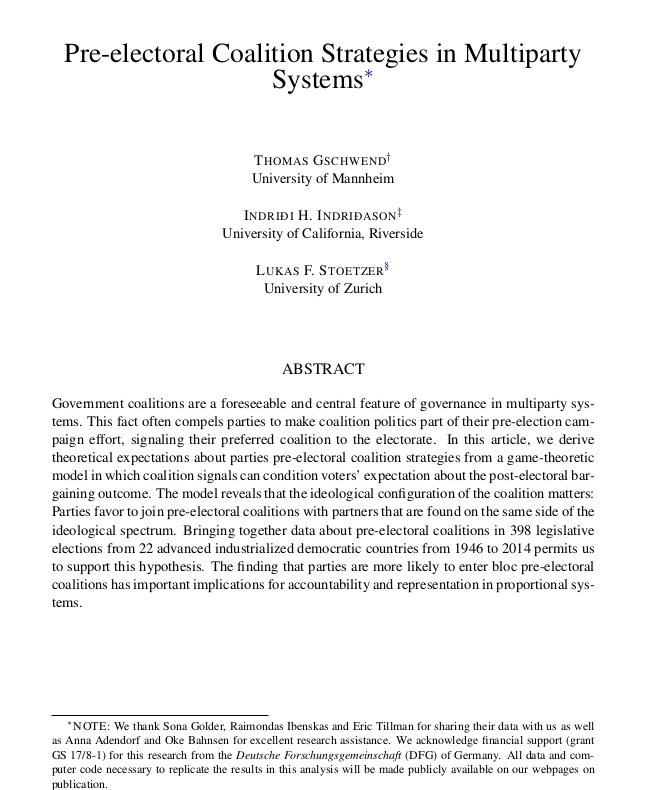 Pre-electoral Coalition Strategies in Multiparty SystemsThomas Gschwend, Lukas F Stoetzer, and Indridi IndridasonEuropean Political Science AssociationConference 2018 and Swiss Political Science Association (SPSA) Annual Conference in Zurich 2019 and 2021. 2021
Pre-electoral Coalition Strategies in Multiparty SystemsThomas Gschwend, Lukas F Stoetzer, and Indridi IndridasonEuropean Political Science AssociationConference 2018 and Swiss Political Science Association (SPSA) Annual Conference in Zurich 2019 and 2021. 2021Government coalitions are a foreseeable and central feature of governance in multiparty systems. This fact often compels parties to make coalition politics part of their pre-election campaign effort, signaling their preferred coalition to the electorate. In this article, we derive theoretical expectations that take voters reaction to pre-electoral coalitions into account under what conditions pre-electoral coalitions form and which parties form such coalitions. The model reveals that the ideological configuration of the coalition matters: Parties favor joining pre-electoral coalitions with partners that are found on the same side of the ideological spectrum. Bringing together data about pre-electoral coalitions in 398 legislative elections from 22 advanced industrialized democratic countries from 1946 to 2014 permits us to support this hypothesis. The finding that parties are more likely to enter bloc pre-electoral coalitions has important implications for accountability and representation in proportional systems.
@article{gschwend2019, bibtex_show = {true}, status = {conf}, project = {pec}, year = {2021}, impact = {3}, title = {Pre-electoral Coalition Strategies in Multiparty Systems}, author = {Gschwend, Thomas and Stoetzer, Lukas F and Indridason, Indridi}, journal = {European Political Science AssociationConference 2018 and Swiss Political Science Association (SPSA) Annual Conference in Zurich 2019 and 2021.}, preview = {wp_pec.png} } -
 Parties’ issue adaptation between electionsCornelius Erfort, Heike Klüver, and Lukas F. Stoetzer2024
Parties’ issue adaptation between electionsCornelius Erfort, Heike Klüver, and Lukas F. Stoetzer2024Are parties responsive to short-term changes in election polls? While party responsiveness to election results has received much attention, we know little about the dynamics of issue attention between elections. In this study, we address this question based on the novel comprehensive PARTYPRESS Database. We rely on supervised machine learning methods to build a dynamic measure of parties’ issue attention on the basis of more than 250,000 press releases from 68 parties across nine countries from 2010 until 2020. We find little support that losing in the polls leads parties to change their issue attention. When political parties lose support in the polls, they do not clearly prioritise their owned issue, they do not pay more attention to popular issues, and they do not adapt the issue focus of successful competitors. These findings have important implications for our understanding of party responsiveness and the dynamics of electoral competition.